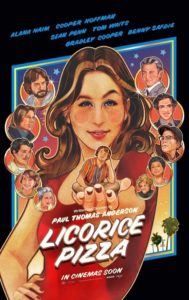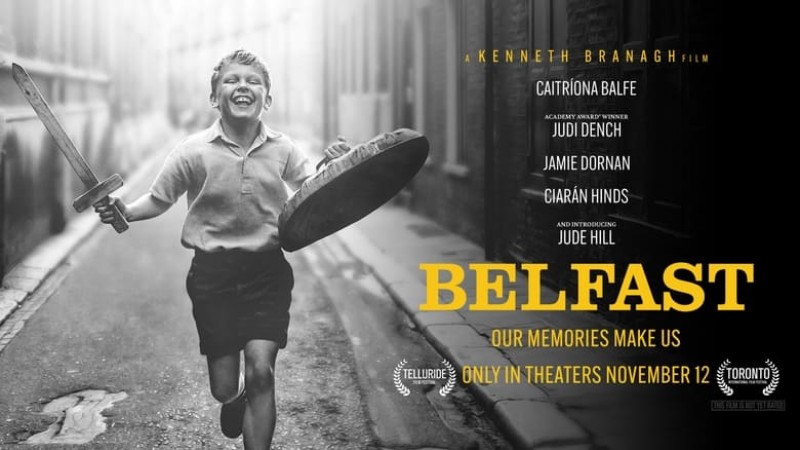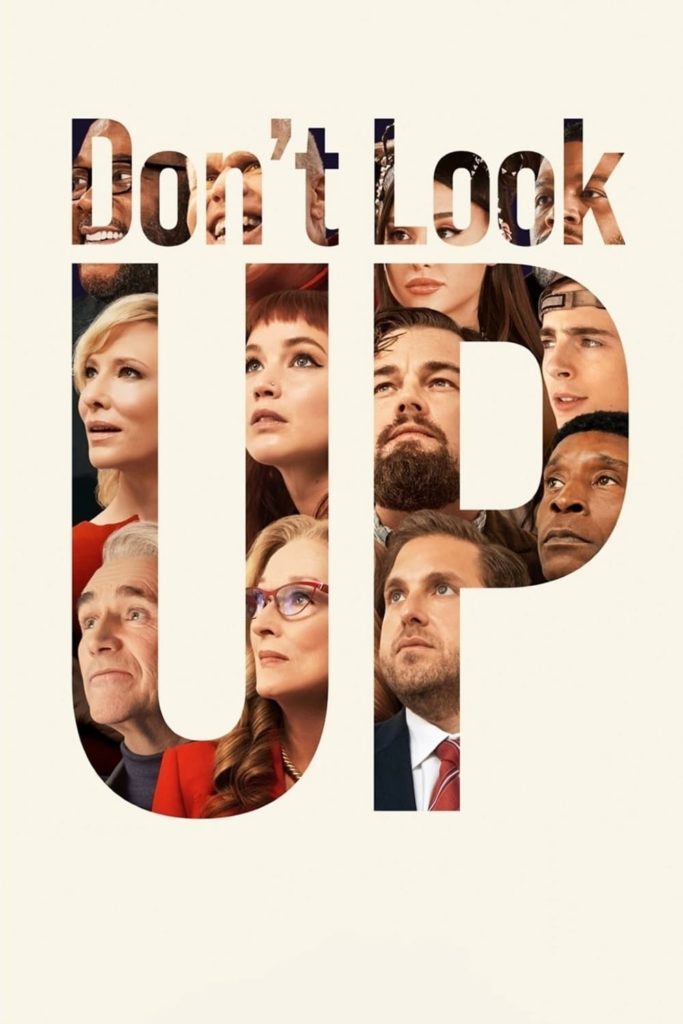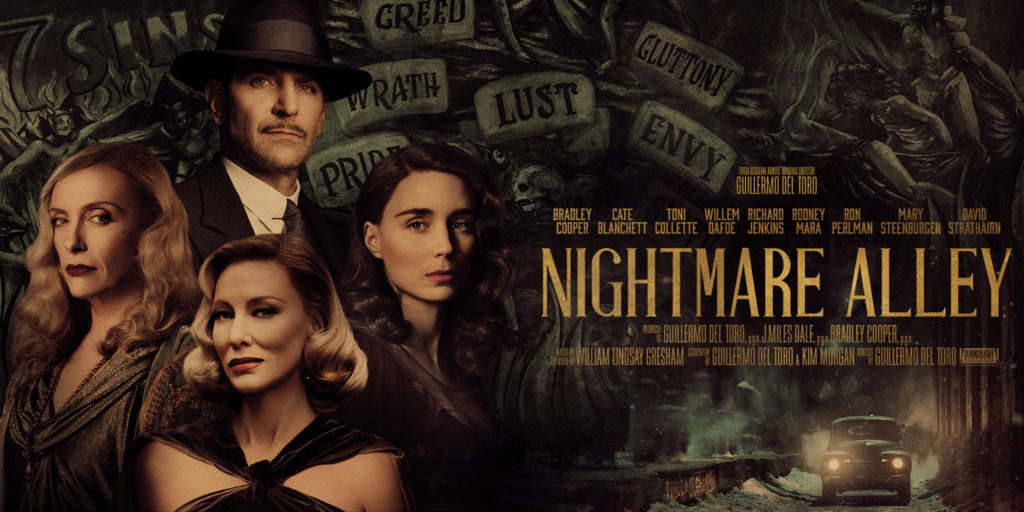#10. Venus and Serena Williams like their dad and are making that our problem
Richard Williams is determined to make two of his daughters into tennis champions, and will allow no thirsty hoodlums, disinterested trainers, or advice/pleading from those who actually know how people become tennis professionals to stand in the way of the plan he concocted since before his girls were born. Which would be at some point after he decided his other kids weren’t worth it. And since the daughters in question are Venus and Serena Williams there’s really only one way this ends. Or so you’d think. Weirdly they went with the Rocky ending and put “They both won a bunch later on” in the end captions, frankly feels like a weird and forced way to try and get some of that Rocky underdog energy in the climax of a movie about legendary tennis champions, but still.
I discovered a word last year which I’m surprised that I, a writer fond of excessive verbosity who loves discussing films didn’t know already: hagiography. It’s a type of biography meant to venerate or idolize the subject. So Gandhi, Darkest Hour, arguably The Imitation Game… you know, the sort of movie I’ve been decrying as the worst type of Oscar bait genre. Because people are complicated, history is always messier than we were taught, and so making a 140 minute movie whose only message is “this guy was neat” seems like, as Aristotle put it, “pointless wankery.” I get that Will Smith and the Williams sisters all think Richard Williams was pretty okay but why do I have to be involved in that.
From the text of the movie it seems obvious that Richard did have some flaws, sometimes some large ones, but since this movie is produced by the Williams sisters and is about their still-alive-at-time-of-writing father, none of these flaws can actually be flaws. Similar to how in Bohemian Rhapsody Freddie Mercury could do drugs and sleep around and party too much but the surviving Queen members, who produced it, were depicted as loving and loyal husbands who were always home by 10 and never late for band practice, they showed up on time and came up with “We Will Rock You” while waiting for Freddy. Trying to make Richard’s constant flaws into secret strengths just makes for tonal dissonance, like how Andrew Lloyd Webber and Tim Rice disagreed on how much Evita should glamourize Eva Peron, so the score is lovely and glamourous but the lyrics are not having it.
Richard’s not an overbearing stage father, those other tennis parents are; they yell at their kids for losing, he just encourages his by saying they’re going to be champions so often they can’t help but make it their identity. Richard’s not wrong to pull Venus out of juniors tournaments against the advice of literally every coach who’ll take her on, he’s just keeping her from burning out like other teen tennis prodigies! He just wants his kids to stay kids, by which he means devoting all their time to homework or tennis practice and being punished for celebrating victories! He’s doing right by Venus, even if he has no concrete plan for her going pro or getting sponsors and maybe running drills over and over won’t prepare her for actual competition! He’s right to yell over and actively contradict every coach Venus has, insisting she needs an open stance! Richard doesn’t ignore Serena when the coaches take an interest in only Venus, keeping her in Venus’ shadow is part of his master plan to make Serena the greatest there ever was! He didn’t come close to tanking both their careers before they started over and over, he had a plan and it worked because he believed and not because of incredible luck and his daughters’ innate skill.
Will Smith is acting his heart out, disappearing in Richard’s Louisiana drawl, mannerisms, physicality, and lingering trauma from his Jim Crow childhood, but this movie didn’t sell me on Richard as someone deserving a biopic, definitely not one this glowing. He’s no Mahatma Gandhi. He’s not even Larry Arabia, and at least that biopic was willing to say “That dude was a mixed bag.”
Where would I rank it? If this were to win (it won’t), on my rank order of all 93 Best Pictures and one Unique and Artistic Picture, it would go way, way down in the “Who is this for other than Oscar voters” district at 66, under The King’s Speech but over Driving Miss Daisy.
But why not…? You know why Spider-Man: No Way Home didn’t deserve a Best Picture nomination? Because it wasn’t even the best superhero movie of 2021. That was James Gunn’s The Suicide Squad. The visuals are stunning, the cast phenomenal, and even d-list villain Javelin’s javelin has a better character arc than the leads of some of these movies. Plus it led to the biggest surprise joy of 2022, Peacemaker, but that’s a topic for another post. It should at least have picked up some technical nominations, for shame, academy.
(Look I know saying The Suicide Squad was snubbed for Best Picture is entirely irrational, I’m not crazy, I know how the industry works, I wouldn’t have said it, but I mean if King Richard is where we’re setting the bar…)
#9. The Course of True Love is Sometimes a Felony
At some point in the early 70s, on class photo day, teen actor/entrepreneur Gary meets disaffected twentysomething Alana, and he’s instantly smitten. Alana tries to rebuff his interest, as she’s 25 and he’s 15, but for lack of anything better to do she gets sucked into his orbit, aiding his business ventures, falling into his friend group, becoming his closest companion in any way save romantic. But while they’re never truly dating, each becomes possessive of the other: Gary falls into sulking or passive aggressiveness should he see Alana with someone else, be they more age appropriate (the always delightful Skyler Gisondo) or somehow less (Sean Penn dropping by for a minute). Alana, likewise, resents any actual teen she sees making moves on Gary. I’d like to tell you there’s a plot beyond that, but there really isn’t, just vignettes of Gary’s business ventures or Alana’s typically failed attempts to build a life or career not tied to Gary, before they finally admit their feelings. Their creepy, illegal feelings.
I mean what even is this movie. Is it a coming-of-age story? No, not really, as the 15 year old protagonist looks 23, acts 47, and has no arc except chasing the next big venture. Is it a romance? I guess, but you don’t want it to be because if they get together one of them is committing a felony. It feels… and I might be totally off base here, to my shame I still haven’t seen Rushmore… but it feels like Paul Thomas Anderson trying to do Wes Anderson, but with his own brand of jaded realism in place of Wes’ sense of whimsy, and that’s like trying to make a Muppet movie without all the pesky puppets.
Anderson tries to make the Alana/Gary pairing less unnerving by making Gary aggressively mature while infantilizing Alana. At 15, Gary is a businessman, spinning his acting money into owning and operating at minimum three at least somewhat successful period-appropriate businesses and making an employee out of his only parent. Also he’s at least a foot taller than any other teen boy in the movie. Alana, meanwhile, is technically a grown-ass adult but is working a menial job, lives at home with her parents and siblings (played by actress Alana Haim’s actual family, which, okay*), and thus at 25 still has to deal with curfew and judgement about her wardrobe. But I don’t know that it helps. That didn’t get me on board with the age difference. He remains a child and reacts to her life choices as a child would.
(*Oh no I just found out that this entire movie is (allegedly) inspired by the fact that Anderson had a crush on Alana Haim’s mother, Donna, when she was his high school art teacher, that’s so much worse)
It’s above King Richard because the conclusion isn’t totally foregone, Bradley Cooper has a delightfully unhinged cameo as Hollywood producer Jon Peters (the villain of Kevin Smith’s stories about trying to write a Superman movie), the characters are somewhat engaging, and their flaws are allowed to be flaws, but what even is this movie, I still don’t know.
Oh and Jesus Christ why, why did they do the bit where John Michael Higgins is a restaurant owner with various Japanese wives who he speaks to not in Japanese, but in English with a horrifyingly offensive Japanese accent? Why? Who was it for? What did serve? It wasn’t funny, it was too weird and specific to be any sort of commentary on early 70s racism/Orientalism, he wasn’t really a character because I’ve already told you everything about him… nobody involved in this movie pulled PTA aside and said “Maybe not?” Jesus, Paul Thomas Anderson, even your Bizzaro duplicate Paul WS Anderson has more sense than that.
Where would I rank it? Right after the “I mean it’s quaint, I’ll give it that” entries and right above the “But who is this even for” district at #64, below You Can’t Take it With You but above Green Book.
But why not…? I haven’t seen it and thus can’t speak to its quality but hey maybe if we’d thrown a few more nominations at The Green Knight it would encourage filmmakers (and the people funding them) to do some more big, weird swings instead of cushy, safe, feel-good biopics. Maybe that’s as important as getting some popular flicks into the ceremony.
#8. Kenneth Branagh’s Childhood, also Troubles
Young Buddy is trying to live an idyllic childhood in late-60s Belfast, but trouble is a-brewin’. In fact, The Troubles. Protestant rioters begin targeting the Catholics on Buddy’s block, and take a very hard-line “With us or against us” stance with Buddy’s father, known as Pa. Pa works in England, and wants to move the whole family there away from the growing unrest, but Ma is less willing to abandon their home to be ill-treated by snooty Brits. But as the Troubles intensify, the family’s choices may start to dwindle.
Based on director Kenneth Branagh’s early years, Belfast feels like the Green Book of 2021, but that also feels mean to say. Like, it doesn’t have the “White man learns to be less racist via having a black friend” angle or the “White Italian teaches rich black man how to be black” nonsense, but it does have the general energy of “I mean it’s fine but why is it here at all, and moreso why is it a frontrunner?“
It’s okay. There’s some clever choices in filming; such as, the bulk of the movie is in black and white, but shifts to colour when Buddy is watching a movie or a play, things that might pop more in the memory of a child. But it’s just… thin. The film’s insights seem to boil down to “Sure did suck having to leave town because the Troubles happened.” Yep, I imagine that’s true, but… we could have guessed that. It seems reluctant to engage with its setting, possibly because it’s about a child who wouldn’t fully understand what’s happening, but that isn’t helping. I think the AV Club put it best here: “its pleasures seem as half-recalled as the formative experiences depicted, as though Branagh were dispassionately attempting to pull some coming-of-age charmer he saw years earlier from his own hazy, imperfect memories.”
Where would I rank it? I’d rank this one down in the “great visuals, weak narrative” district at #54, under Sunrise but over Nomadland.
But why not…? No Time to Die. Yeah, that’s right, I’m not saying “They should have nominated a blockbuster” was wrong, I’m just saying Twitter’s screaming about the wrong one. No Time to Die was an emotional, tense, gorgeously shot ending to the Daniel Craig era of James Bond, the first era to present a Bond who’s more than a vehicle for action and quips. It’s only held back by the fact that the only Craig-era Bonds to try to build an overall narrative to the series were the worst ones (Quantum of Solace and Spectre), so No Time to Die can’t ignore the events of Spectre but is also way too eager to move past the events of Spectre. So the final villain is Some New Guy instead of Blofeld, because despite the utterly perfect casting of Christof Waltz nobody cared about Blofeld. Oh and also how dare they introduce such great characters as Ana De Armas’ delightful Paloma and Lashanna Lynch’s Nomi/new 007 then end this continuity instead of giving those two their own movie.
Still better shot and more emotionally affecting than Belfast is all I’m saying.
#7. Yeah, Humanity is Screwed: The Motion Picture
Two astronomers desperately attempt to warn the world that Earth is on a collision course with a planet-killing comet, but are foiled in this by apathy from government, an overly glib and aggressively upbeat media, opportunistic tech bros, and a large swath of humanity’s tendency to ignore science the second someone even slightly folksy tells them to. It’s super subtle, but if you really look, you might see some satire directed at climate change denial or antivaxxers, really anyone who will ignore any attempt to continue the existence of humanity if it’s even slightly inconvenient or involves listening to smart people.
It’s got some good humour to it and the cast is of course great, from Meryl Streep’s largely apolitical parody of ineffective political leaders to Jennifer Lawrence’s increasing and increasingly amusing nihilism, and Leonardo DiCaprio being the only one playing it straight. But… it’s very much preaching to the choir. People who wear masks and get vaccinated and care about the climate crisis will say “Yes we know” and maybe feel a little dejected watching all the things we know are problems stop the voices of reason from saving the Earth. The people causing all the problems will snort and mutter “libtard sheep” and rewatch the God’s Not Dead series or whatever Tucker Carlson tells them they’re into.
It is fun in several places, the cast is stellar, and I’m not mad I watched it, but I wouldn’t hold it up with the likes of Argo, Platoon, or even Going My Way. Or frankly even The Big Short, director Adam McKay’s earlier, much sharper message comedy movie. It’s an okay watch, but I don’t think it’s going to accomplish what they want.
(Fun fact, we are living in the first period of human history where we definitively know that no planet-killing comets or asteroids are coming. We know where every one capable of ending life on Earth is, and none of them are heading our way. Maybe one big enough to take out, like, Cleveland hits us, but still, one less thing.)
Where would I rank it? It’s in “Fun but empty calories” territory, under the better musicals at 51, between The Sound of Music and Hamlet.
But why not… Where the fuck is The French Dispatch of the Liberty, Kansas Evening Sun. Why do you even have awards for production design or cinematography if you’re not nominating The French Dispatch of the Liberty, Kansas Evening Sun. Am I the only one who still loves Wes Anderson’s sense of whimsy?
#6. Great Visuals and Poor Life Choices
1939: drifter Stanton Carlisle, for lack of somewhere else to be or something else to do, falls in with carnival folk. He learns the mentalist grift from Zeena the Seer and her drunk husband Pete, while crushing on Molly, whose act involves pretending to absorb electricity, and picking up some facts about the dark side of carnival life from purveyor of natural oddities Clem Hoatley. A lot to take in, yes? Well that’s all just prologue. I mean, it’s somewhere between a third and a half of the movie but yeah, prologue. The story part of the story is two years later, as Stan, having mastered the mentalist game during his months at the carnival (quick study I guess) is doing two shows a night in the big city of Buffalo with Molly as his partner. A local judge thinks Stan’s his chance to find closure with his dead son, and against all advice he’s ever had or ever will, Stan decides to do what they call a “spook show,” and soon he’s in deep with the exact wrong sort of people to be in deep with, and we’re in Sunset Boulevard noir territory, maybe everyone keeps pleading with Stan not to do spook shows for a reason.
Guillermo del Toro directed it so the cast is stacked and everything looks gorgeous. From the carnival to the office of the femme fatale psychologist Stan starts working with to the luxurious home of his ill-chosen mark, the sets look great. The camerawork is clever. The sad turns of the denouement are set up in the first act clearly enough that when you hit the last few minutes you see where things are headed, but not so obviously that you’d intuit this was always being set up… or it wouldn’t be if the set-up scene didn’t drop the movie’s title. My one complaint is… why? Why any of this?
So much of who Stan is and what drives him is hidden for the whole prologue. Is he loyal to the people he cares for? Is he only out for himself and good at convincing people that helping him is helping them? He sure did learn how to do mentalist grifts fast, how long has he been good at cold-reading? This all seems kind of important to me because maybe if I knew what drove Stan, what hunger drives him to risk everything for what everyone, especially the ones who taught him the grift, have given dire warnings against doing. Sure when we meet him he’s poor, but is he “Cross every line to earn a fortune” poor? Was the big score of the spook show going to provide some end goal, or is it just what Doc Holliday said in Tombstone: “A man like [that] has got a great big hole, right in the middle of him. He can never kill enough, or steal enough, or inflict enough pain to ever fill it.”
Anyway it sure looks nice and the cast is great, but it would be nice to be able to connect with a character at some point, maybe I could have gotten more invested in the story that way.
Where would I rank it? Not much higher than Don’t Look Up. It’d be at #50, over The Sound of Music but under West Side Story.
But why not… I know the Academy doesn’t like horror movies but Candyman was as well-shot, as well-cast, and as bleakly engaging as Nightmare Alley, but way less white, might have been worth a look.
Next Page: The ones I’d actually recommend





